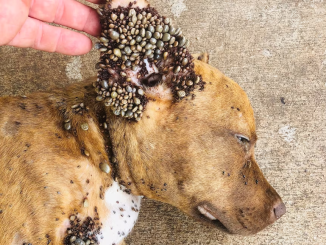Dogs’ brains are sensitive to the familiar high-pitched “cute” voice tone that adult humans, especially women, use to talk to babies, according to a new study.
The research, published recently in the journal Communications Biology, found “exciting similarities” between infant and dog brains during the processing of speech with such a high-pitched tone feature.
Humans tend to speak with a specific speech style characterised by exaggerated prosody, or patterns of stress and intonation in a language, when communicating with individuals having limited language competence.
Such speech has previously been found to be very important for the healthy cognitive, social and language development of children, who are also tuned to such a high-pitched voice.
But researchers, including those from the Eötvös Loránd University in Hungary, hoped to assess whether dog brains are also sensitive to this way of communication.
In the study, conscious family dogs were made to listen to dog, infant and adult-directed speech recorded from 12 women and men in real-life interactions.
As the dogs listened, their brain activities were measured using a functional magnetic resonance imaging (fMRI) scan.
The study found the sound-processing regions of the dogs’ brains responded more to dog- and infant-directed than adult-directed speech.
This marked the first neurological evidence that dog brains are tuned to speech directed specifically at them.
“Studying how dog brains process dog-directed speech is exciting, because it can help us understand how exaggerated prosody contributes to efficient speech processing in a nonhuman species skilled at relying on different speech cues,” explained Anna Gergely, co-first author of the study.
Scientists also found dog- and infant-directed speech sensitivity of dog brains was more pronounced when the speakers were women, and was affected by voice pitch and its variation.
These findings suggest the way we speak to dogs matters, and that their brain is specifically sensitive to the higher-pitched voice tone typical to the female voice.
“Remarkably, the voice tone patterns characterizing women’s dog-directed speech are not typically used in dog-dog communication – our results may thus serve evidence for a neural preference that dogs developed during their domestication,” said Anna Gábor, co-first author of the study.
“Dog brains’ increased sensitivity to dog-directed speech spoken by women specifically may be due to the fact that women more often speak to dogs with exaggerated prosody than men,” Dr Gabor said.

‘Dumped’ 16-Year-Old Dog’s Distressing Cries Rocked Woman To Her Core
At 16 years old, Link, a senior dog, found himself abandoned at a shelter, bewildered and heartbroken. The little dog, who had spent his entire life with one family, couldn’t understand why he was left behind and would cry for hours in confusion.
Enter Carly, who discovered Link through a photo shared by her friend Angel. Despite Link’s advanced age and health issues, Carly felt an immediate bond with him and knew she had to give him the loving home he deserved. Upon meeting him at the shelter, their connection was undeniable, with Link calming down as soon as he heard Carly’s voice and felt her soothing touch.
Without hesitation, Carly made the decision to adopt Link, giving him the chance for a new beginning in a forever home filled with love and care.
Image/Story Source Credit: GeoBeats Animals via YouTube Video
After Carly brought Link home, she observed how her own dog, Toad, was ecstatic to meet his new friend. In the initial days, Toad was particularly attentive to Link’s health concerns, staying by his side constantly. Link, troubled by skin problems, would often whine and itch. Recognizing Link’s distress, Toad assumed the role of his emotional support, a role he continues to fulfill to this day.
Image/Story Source Credit: GeoBeats Animals via YouTube Video
After two years with Carly, Link has transformed from a shy, almost furless dog into a vibrant, furry companion. Now approximately 18 years old, Link has regrown a significant amount of fur and appears entirely different. Toad, the cuddly 80-pound dog, adores his tiny 7-pound brother, and they are often found snuggled together on the couch.
Carly frequently hears comments from onlookers about the unique duo during their walks. Despite his advanced age, Link is an energetic and demanding dog, always ready to bark, explore, and meet new people.
Link’s health has seen considerable improvement under Carly’s care. Although he has a cataract in one eye that affects his vision, Carly has ensured that he receives all necessary treatments for his allergies and skin issues, allowing him to enjoy a much more comfortable and happy life.
Carly and Toad consider themselves fortunate to have Link in their lives and are thankful for the chance to care for him and shower him with love in his final years. While I can’t play videos, I can imagine the heartwarming scenes of Link’s remarkable transformation and his endearing bond with Toad. This story serves as a beautiful reminder that dogs of all ages are worthy of a forever home and the unconditional love they bring to our lives.



Leave a Reply